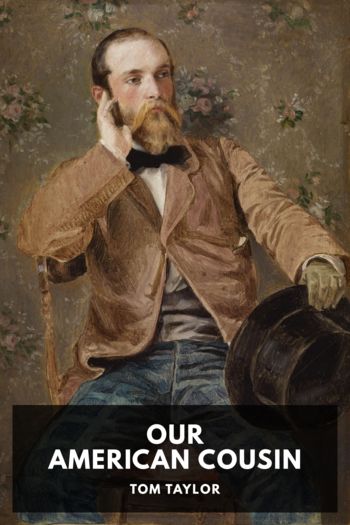Daughters of the Summer Storm by Frances Statham (best sci fi novels of all time .TXT) 📗

- Author: Frances Statham
Book online «Daughters of the Summer Storm by Frances Statham (best sci fi novels of all time .TXT) 📗». Author Frances Statham
With a jerk, the carriage stopped, and Marigold was immediately awake. "Are we at Cedar Hill?" she asked. She remembered to smile at Crane, and the dark-haired man, surprised at her friendliness, returned her smile.
"Not yet," Crane answered. "But it won't be long now. Jake has only to take us across the river on the ferry, and then it's less than a mile.
"If you would like to get out and stretch your legs, Marigold—you and Mother—I'll go and signal Jake that we're here."
Crane stepped down from the carriage, and in a cavalier manner, he placed the footstool on the ground and helped Marigold and Julie to alight from the vehicle that had held them for so long.
At first, her legs were stiff from the constant sitting. So Marigold stamped her feet on the ground and brushed the dust from her green silk crepe dress. The dust rose up in a cloud and Marigold coughed.
Julie laughed at the surprised look on her daughter-in-law's face. "It will be nice, will it not, to soak in a soothing hot tub of water tonight?"
"I don't think I will ever get all the dust off," answered Marigold, who removed the matching silk-ribboned bonnet and shook her long, golden hair free of restraint. Despite herself, Marigold gazed over the land with interest.
The Catawba River, red and swollen from the recent rain, was no replica of her gray, civilized Ashley River that pulsed gently with the tides and only misbehaved occasionally when a coastal hurricane unleashed its strength to push the water out of bounds. This was raw power, impatiently hemmed in by the rugged banks, threatening to spill over into the bottomlands at any moment. Primitive, pagan and restless—
And guarding this angry red water was one lonely sentinel on its banks—a weathered gray post with a bell at the top.
Marigold watched as Crane walked toward it. His hands reached out to the bell rope, and Marigold jumped at the ominous clang that echoed up and down the deserted river.
In the nearby bottomlands, with the old cornstalks bent and bleached by the early autumn sun, a covey of brown and white quail flew off in a whirr of wings. And then, the landscape was silent again.
An excited shiver passed through Marigold's body, and Julie, beside her, mistaking the movement for one of fright, explained to her. "Crane is calling old Jake to let him know we want to cross the river. If you look hard, you can see the ferry."
Marigold, shading her eyes against the late afternoon sun, peered in the direction that Julie pointed. In fascination she watched the small, wooden, raft-like structure leave the opposite bank. Attached with a rope to the taut metal cable stretched from one bank to the other, the craft looked fragile and unstable. When it swung too far downstream, the man took his long pole and guided the raft back upstream. Each time it went too far downriver, the man used the pole to correct its course, digging the pole into the water and pushing, as if he were a Moses calling on the water to obey him.
The raft finally slammed into the riverbank, and a violent rattle filled the air as Jake flung the chains from the end of the raft and proceeded to jump onto the bank. He quickly attached the metal hooks at the end of the two chains into rings embedded in the wooden planks, securing the ferry to the bank.
When the man had finished, Sesame moved the carriage forward, and Marigold, standing to the side, held her breath. There was nothing to keep the horses from going too far—from pitching the carriage over into the river beyond the raft. Nothing except Sesame's steady hand.
Just when Marigold thought the carriage was lost, Sesame yelled and pulled on the reins. Finally the carriage stopped, and Marigold began to breathe easily again.
Crane stood on the bank, his hand out to help Julie and Marigold down the slippery planks onto the ferry.
"Is this. . . the only way to get to Cedar Hill?" Marigold asked, trying to keep the alarm from showing in her voice.
"No," Crane answered, "but it's the shorter way. And we're lucky to get here when we did. Old Jake doesn't cross the river after sundown. Would you like to get back into the carriage?" Crane asked.
It mattered little to Marigold. Being in the carriage seemed just as dangerous as standing by the railing, but at least it was a place to sit down, and Marigold's knees felt unsteady.
6
The carriage wound its way up the hill, leaving the riverbank behind. Jake had not wasted any time; for almost as soon as the carriage wheels left the ferry, the man cast off to return to the shack on the other bank for the night.
Marigold could feel the unspoken antagonism between her husband and the black man, Jake. And she wondered what had happened in the past for Crane to resent the old man so much.
Her curiosity overcame her reticence to question Crane about it. Impulsively, she said, "Why do you and Jake not like each other, Crane?"
The man's fingers gripped the strap hanging on the side of the carriage, and even though his voice was controlled, he could not keep the animosity completely out. "Jake is that oddity—a free black man. He is too proud—bad influence on the slaves. They might get the idea that they would like to be free, too."
"Slaves? You mean you have slaves at Cedar Hill?"
"Don't look so surprised, Marigold. What do you think Sesame is?"
"I n-never thought about it. But back when Maman and Jason visited Cedar Hill, there weren't any slaves."
"You'll find that many changes have been made since I became master," Crane emphasized. "It was a matter of expediency—because of the gold mine. As long as we did the placer mining—getting the gold from the





Comments (0)